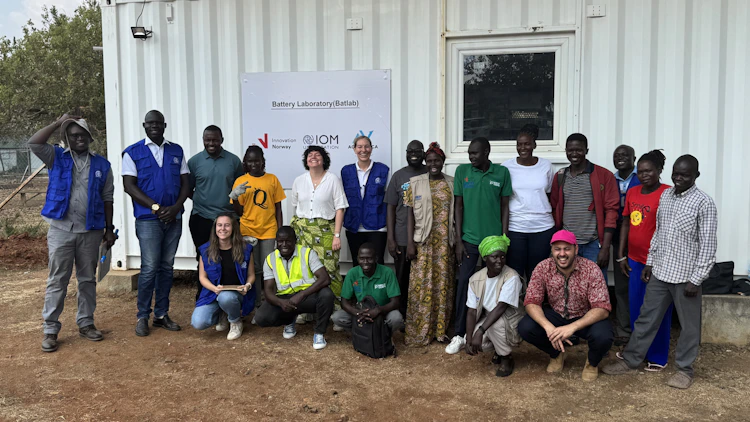Why producer engagement is important for solving the e-waste challenge in displacement settings: Lessons from Cox’s Bazar
Solar lamp producers who supply humanitarian organisations in displacement settings have a critical role in supporting organisations managing electronic waste (e-waste). Explore how BRIGHT’s Repair Program supported impactful repair initiatives in Cox’s Bazar Kutupalong settlement.
All articles
-
![Repair trainees learn how to fix solar lamp PCBs as part of BRIGHT’s humanitarian e-waste programme.]()
- Sustainability
- Field work
- Humanitarian
- Repair
- Insights
Why producer engagement is important for solving the e-waste challenge in displacement settings: Lessons from Cox’s Bazar
Solar lamp producers who supply humanitarian organisations in displacement settings have a critical role in supporting organisations managing electronic waste (e-waste). Explore how BRIGHT’s Repair Program supported impactful repair initiatives in Cox’s Bazar Kutupalong settlement.
Read more
-
![Joona Cichy sits next to some of the SunTurtle solar lamps he bought for donation to learners in Ghana and Madagascar through his Bright Futures ngo]()
- Stories
- Humanitarian
Bright Futures: How a 16-year-old is donating solar lamps to help learners study after dark
In Cologne, Germany, December darkness settles early. Most students move from school to after-school clubs and switch on their desk lamps without a second thought. Yet for millions of children elsewhere, nightfall closes the school day altogether. This contrast prompted one student to act.
Read more
-
![BRIGHT solar lamp Repair Program in Bidibidi Uganda. Group photo of E-waste Management project participants, featuring representatives from BRIGHT and IOM (© BRIGHT).]()
- Stories
- Sustainability
- Field work
- Humanitarian
BRIGHT’s solar lamp Repair Program: Partnering on the leading e-waste management project in the humanitarian sector
In Uganda’s Bidibidi refugee settlement, the International Organization for Migration (IOM) is leading several partners in pioneering the most comprehensive electronic waste (e-waste) management project in the humanitarian sector. At the heart of this project is BRIGHT’s solar lamp Repair Program which is training technicians who are turning e-waste into opportunity through the repair and refurbishment of solar lamps. These technicians have since the launch of the E-waste Management project in 2022 repaired 6,361 solar lamps and 341 solar panels, reduced e-waste, and significantly improved their livelihoods. By embracing a circular economy, improving product design, and centering community voices, BRIGHT’s Repair Program offers a sustainable model for handling e-waste in displacement settings, aligning with Sustainable Development Goals 7 (Affordable and Clean Energy) and 12 (Responsible Consumption and Production).
Read more
-
![Image by Freepik]()
- Humanitarian
- Sustainability
- Collaboration
How innovation-friendly procurement can make humanitarian aid more sustainable
Procurement may not be the most glamorous function in humanitarian operations, but it is one of the most powerful. As crises grow in complexity and urgency, the systems behind aid delivery must evolve. At the heart of this transformation lies a quiet revolution: innovation-friendly procurement.
Read more
-
- Collaboration
- Humanitarian
- News
Pioneering Partnerships: BRIGHT at DIHAD
BRIGHT has been a proud participant at the Dubai International Humanitarian Aid and Development (DIHAD) Conference & Exhibition for several years. We are back again this year with a booth at the Norway Pavillion organized by Innovation Norway. But why exactly are we here? Why DIHAD?
Read more
-
![BRIGHT Fieldwork hands on solar lamp repair program in Cox Bazar Bangladesh]()
- Field work
- Sustainability
- Humanitarian
Solar lamp repair & e-waste management in Cox’s Bazar Kutupalong refugee camp
In the heart of the world's largest refugee camp, access to reliable solar energy is more than a convenience, it is a crucial lifeline. Cox's Bazar's Kutupalong settlement, home to nearly one million Rohingya refugees, faces ongoing challenges from a long-running humanitarian crisis and increasingly frequent climate-related disasters. Recognising this, BRIGHT has made it a priority to improve access to sustainable solar lighting and energy in the camp by talking with end-users, understanding the e-waste challenge in the settlement, and by providing hands-on training on solar lamp repair.
Read more
-
![BRIGHT Products SunBell solar lamp being used to provide light while cooking]()
- Sustainability
- Stories
- Humanitarian
SunBell: first solar lantern categorized as a UNHCR core relief item
Access to light and mobile charging is a critical basic need for people forced to flee their homes. Since 2014, over 4 million SunBell solar lamps with built-in phone chargers have been distributed globally, transforming the lives of displaced families by offering safe, clean, and reliable lighting.
Read more
-
![BRIGHT Products SunBell solar lamp charging in the sun (Credit photo: Mostofa Siraj Mohiuddin)]()
- Sustainability
- Humanitarian
Lighting the way: How solar lamps transform life in refugee camps
Providing core relief non-food items is essential for families and individuals forced to flee their homes, often with nothing but the clothes on their backs. While plastic sheets, blankets, kitchen sets, and soap are vital, one item often overlooked but equally life-changing is light. Imagine navigating daily life without it. In refugee camps around the world, the absence of lighting after sunset can turn already difficult conditions into dangerous ones. Discover how solar lamps make an impact in these settings.
Read more








